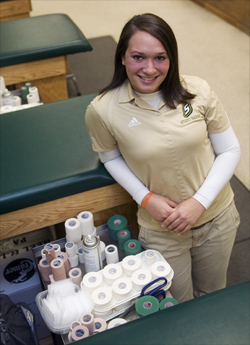Learning by doing
On the homepage:
Click on thumbnail above to see larger photo.
Nicole Finch, center, discusses her case study with Southeastern defensive end, Walter Vaughn, left, and Karen Lew, athletic training education program director.
Nicole Finch, Athletic Training major, Department of Kinesiology and Health Studies
Karen Lew, Athletic Training Education program Director
In Southeastern’s Athletic Training Program, many students are gaining valuable experience through case studies and working hand in hand with their professors.
Senior Nicole Finch of Franklinton was one of only 11 students nationwide selected to present a clinical case study at the 23rd annual Southeast Athletic Trainers’ Association (SEATA) Student Symposium in Atlanta, Ga.
Finch’s case study, “Upper Extremity Injury in a Collegiate Football Player,” developed from her work with Southeastern’s football team this fall. During a game with Kansas, defensive end, Walter Vaughn, suffered a broken arm. “I knew immediately that I wanted him to be my case study,” Finch said.
 |
| Nicole Finch, Athletic Training major |
Vaughn calls his experience with the case study “bittersweet.”
“Nicole helped me rehab and helped further explain what is wrong with me,” Vaughn said. “She has helped me try to gain my movement back, and I expect to have a great season this year.”
Karen Lew, athletic training education program director, has worked with Finch on her case study and says the experience has helped Finch to become more involved in rehab and research.
“Nicole was always a good student, but this has propelled her to be excellent,” Lew said. “It’s proved to her that she can do more than tape ankles. She can do research.”
Although case studies are part of collegiate life, Finch’s case study was rather special.
“Most people have never seen an injury of this type,” Finch said. “It is definitely a unique experience. Even the athletic trainers here have never seen anything like it.”
“Nicole’s case study is pretty significant because of deviations from expectations and that she has truly been a part of the study from beginning to end,” Lew said. “She was actually the first one to see the injury happen and has followed it through surgery, CT scans, everything. That’s unique.”
Although there are four other pro athletic training programs in Louisiana, Southeastern’s was the first accredited program in the state and boasts a student to instructor ratio of 1:7.
“What makes this program different from the others,” Lew said, “is the amount of support that we get here from both athletics and the administration both departments work together.”
“For example, at bigger schools their athletic programs are so high profile that sometimes their students don’t get the same level of experience from athletics and academics,” Lew added. “Here we are small numbers and that promotes a good working relationship.”
Finch and Lew have spent countless hours perfecting the case study on evenings and weekends and plan to submit it to two additional organizations after the symposium.
“How many faculty are going to stop and spend their evening with students working on a project,” Lew said. “That’s what separates us from the other athletic training programs. Students will tell you that they want to come here because it’s small numbers of students and more personable.”
More Homepage Stories...

